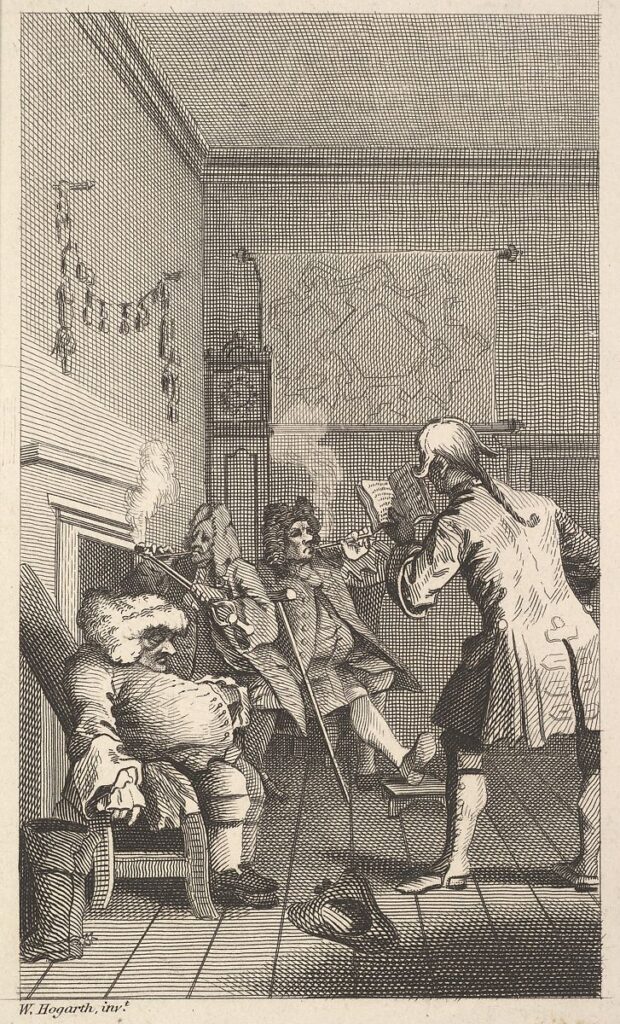Friday
I have lots of thoughts about the Congressional hearings on Donald Trump’s January 6 coup attempt, which opened last night, and am working up a post that references Milton’s rebel angels. I’ll end this week, however, on a lighter note, an interesting footnote that my English professor son alerted me to. Apparently, Laurence Sterne’s Tristram Shandy played havoc with clock sales following its publication in 1759.
Toby Wilson-Bates alerted me to a pamphlet that appeared following publication entitled “The clockmakers outcry against the author of The life and opinions of Tristram Shandy. Dedicated to the most humble of Christian prelates.” The author complained,
The directions I had for making several clocks for the country are countermanded; because no modest lady now dares to mention a word about windingup a clock, without exposing herself to the sly leers and jokes of the family … Nay, the common expression of street-walkers is, “Sir, will you have your clock wound up ?”
Apparently the pamphlet also notes that virtuous matrons were disposing of their clocks for fear that they would excite “acts of carnality.”
The offending passage occurs in the second paragraph of the novel:
Pray, my Dear, quoth my mother, have you not forgot to wind up the clock?———Good G—! cried my father, making an exclamation, but taking care to moderate his voice at the same time,——Did ever woman, since the creation of the world, interrupt a man with such a silly question? Pray, what was your father saying?———Nothing.
Tristram is telling his life story and figures that he should start at the beginning—which is to say, at the moment of his conception. His mother, operating by chain of association, thinks of the clock at the moment that his father is impregnating her with Tristram. Her question functions as a comment about the clockwork way that Walter Shady goes about having sex.
Indeed, the elder Shandy, an Enlightenment enthusiast, is so captivated by machinery and scientific thinking that he can’t accept the world in all its messy unpredictability. His insistence that scientific forceps rather than midwife knowledge be used in his son’s birth play havoc with his son’s nose. He has such definitive notions on how a child should be raised that he spends all his time writing a book on the subject during Tristram’s childhood, all the while ignoring Tristram, who grows up on his own. Sterne’s book is largely a satire of attempts to over-regulate human behavior.
Apparently clocks were an unintended casualty of his satire—or perhaps not so unintended since Sterne, in his belief in acting naturally, would probably prefer us to respond to the sun and the seasons than clocks. I am reminded of John Wilmot’s own mention of clocks in his “Satyr against Reason and Mankind.” Contrasting “right reason” with mechanistic behavior, Wilmot writes,
My reason is my friend, yours is a cheat;
Hunger calls out, my reason bids me eat;
Perversely, yours your appetite does mock:
This asks for food, that answers, “What’s o’clock?
The passage that interrupted the clock trade also reminds me of another sexual innuendo that, for a while, made it impossible to talk about china in polite company. In William Wycherley’s 1675 comedy The Country Wife, Lady Fidget is having an adulterous affair with Horner after having told her husband she is going out to buy china. When Sir Jasper Fidget finds her in Horner’s apartment, Horner claims that she has come to examine his china collection and they go into a back room. When Lady Squeamish, another of Horner’s mistresses, shows up, she (unlike Sir Jasper) figures out what’s going on and insists that Horner provide her with china as well:
Re-enter Lady Fidget with a piece of china in her hand, and Horner following.
L. Fid. And I have been toiling and moiling for the prettiest piece of china, my dear.
Horn. Nay, she has been too hard for me, do what I could.
Mrs. Squeam. Oh, lord, I’ll have some china too. Good Mr. Horner, don’t think to give other people china, and me none; come in with me too.
Horn. Upon my honour, I have none left now.
Mrs. Squeam. Nay, nay, I have known you deny your china before now, but you shan’t put me off so. Come.
Horn. This lady had the last there.
L. Fid. Yes indeed, madam, to my certain knowledge, he has no more left.
Mrs. Squeam. O, but it may be he may have some you could not find.
L. Fid. What, d’ye think if he had had any left, I would not have had it too? for we women of quality never think we have china enough.
In a follow-up play (The Plain Dealer), Wycherley has fun referencing his earlier play by having a couple of characters discuss the effects of this china scene:
Olivia: I’m resolved to make you out of love with the play. I say, the lewdest, filthiest thing is his china; nay, I will never forgive the beastly author his china. He has quite taken away the reputation of poor china itself, and sullied the most innocent and pretty furniture of a lady’s chamber; insomuch that I was fain to break all my defiled vessels. You see I have none left; nor you, I hope.
Eliza: You’ll pardon me, I cannot think the worse of my china for that of the playhouse.
Olivia: Why, you will not keep any now, sure! ‘Tis now as unfit an ornament for a lady’s chamber as the pictures that come from Italy and other hot countries; as appears by their nudities, which I always cover, or scratch out, whereso’er I find ’em. But china! out upon’t, filthy china! nasty debauched china!
Needless to say, both china and clocks made comebacks after these works appeared. For a while there, though, clockmakers and china salesmen were worried.


